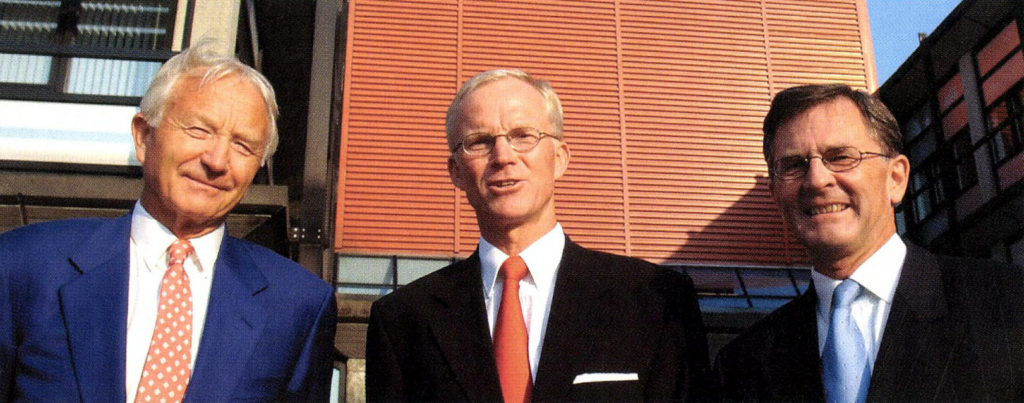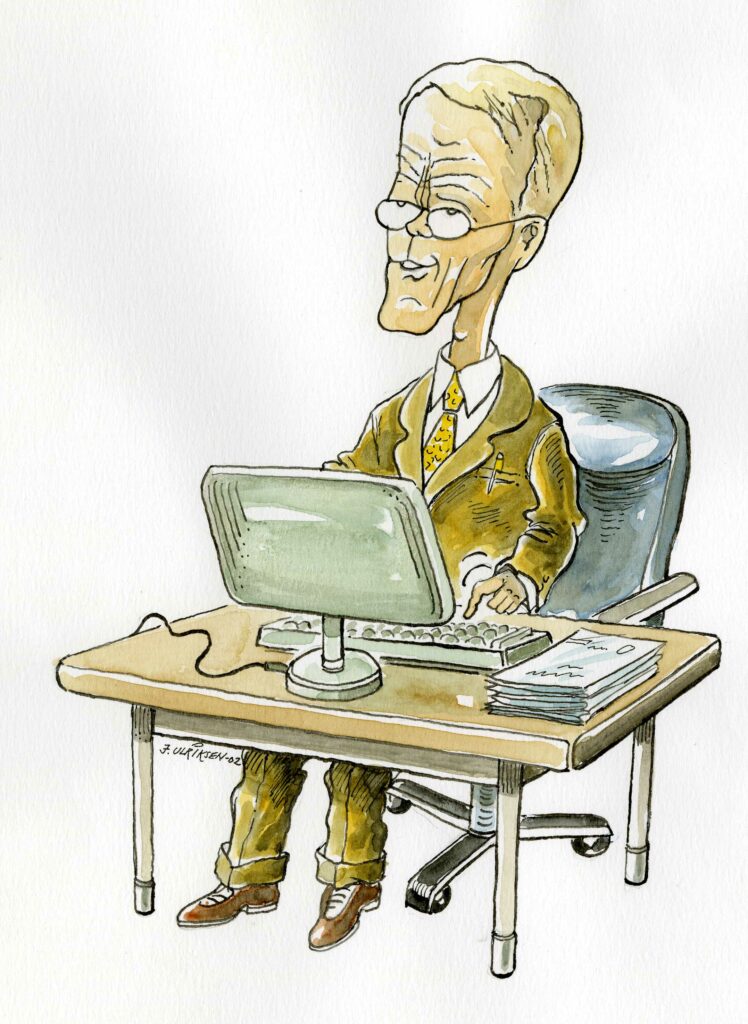Olav Fjell – with a banking background

Fjell was born on 28 June 1951 at Bardu in Troms county. Coming from a military family, he moved around a lot during his upbringing and studied at the infantry officer school for southern Norway. He took an MSc in business economics at the Norwegian School of Economics in 1975.
He began his professional career in the same year as an economist at Kongsberg Våpenfabrikk, and became a vice president before leaving in 1987 – the same year the company went bankrupt. Fjell then joined Bergen Bank and later DNB.[REMOVE]Fotnote: https://en.wikipedia.org/wiki/Olav_Fjell He continued his banking journey as CEO of Postbanken in 1995-99 before being recruited to Statoil by Ole Lund, chair of Postbanken as well as Statoil and well acquainted with Fjell.
The new CEO had a reputation as a hard-working and upright man, but had no experience of the oil industry. That meant he had much to learn in his new job.
Partial privatisation
Much of Fjell’s course had been set by his predecessor, Harald Norvik, who had to resign because of cost overruns on the Åsgard development in the Norwegian Sea. That applied above all to goal of a partial privatisation for the company.
After the big wave of mergers in the industry around 2000, international competition between the oil companies had become even tougher. Norvik took the view that Statoil needed to be liberated from a number of the political constraints imposed by full state ownership if it was to become a player on the world stage. These included reporting to the minister of petroleum and energy as the annual general meeting and ultimately to the Storting (parliament). Partial privatisation and a stock market listing, but with the state remaining the majority shareholder, would give Statoil a freer position. It would report to the board. The company also saw stronger financial muscles for investing abroad as desirable. At the top of its wish list was a return of the assets covered by the state’s direct financial interest (SDFI).[REMOVE]Fotnote: Storsletten, Aslak Versto, 2018, Prosessen bak delprivatiseringen av Statoil i 2001 – fra selskap til vedtak: 33-41.
During his first two years as CEO, much of Fjell’s energy was devoted to achieving a partial privatisation and listing of the company.
After the government presented Proposition (Bill) no 36 (2000-2001) on ownership of Statoil and future treatment of the SDFI, the Storting agreed that Statoil should be allowed to purchase 15 per cent of the SDFI’s interests on the Norwegian continental shelf (NCS). That would increase its licence holdings and thereby its future revenue base. Statoil also secured a listing on the Oslo and New York Stock Exchanges on 18 June 2001.[REMOVE]Fotnote: Ryggvik, Helge, 2009, Til siste dråpe: 257-276.

Ethics and sustainability
In connection with Statoil’s international engagements, Fjell intensified the attention being paid by the company to ethics and sustainability.
Statoil had been faced on several occasions with demands in Norway that it should play a political role in some of the host countries where the authorities used their oil revenues for extravagant spending and corruption. Fjell believed the company should tread carefully here.[REMOVE]Fotnote: Fjell, Olav, 2002, “Bærekraftig olje- og gassutvikling – selvmotsigelse eller realistisk ambisjon?”: 21.
A vice president responsible for human rights and country analyses was appointed, while employees were coached on ethical awareness and whistleblowing. Amnesty International gave them courses on human rights. Statoil was included on the Dow Jones Sustainability Index, which measured thousands of companies on the basis of specified criteria.
Fjell believed that Statoil should contribute to sustainable development, and annual sustainability reports were prepared for the first time.[REMOVE]Fotnote: Ibid: 9-12. The CEO did not think international environmental and climate challenges signalled the end of the petroleum sector’s role and significance, but felt the company had to meet the challenges in an innovative way.
Statoil was not alone in its concern with ethics and sustainability at the start of the 2000s. BP had changed the meaning of its name from an abbreviation of British Petroleum to Beyond Petroleum. Together with UK prime minister Tony Blair, it proposed that oil companies should make their financial transactions public. If more countries and companies closed ranks against corruption, the culture would change over time. A number of companies and states signed up to this initiative.[REMOVE]Fotnote: Borchgrevink, Aage Storm, 2019, Giganten: 288.
In the meantime, Statoil’s international commitment was unquestionably going to continue even though these waters could be difficult to navigate. Fjell appointed Richard John Hubbard, with a background from BP, to strengthen this involvement after the alliance with the UK oil company ended in 1999.

Things went wrong in connection with one of Hubbard’s efforts to secure licences in Iran. Statoil was charged with corruption. Ironically, this scandal culminated with Fjell – who maintained that “a high ethical standard is a precondition for our business” – having to resign.
In a speech he gave in 2002, Fjell observed: “I’m in no doubt that accusations of corruption or breaches of our ethical rules would be serious for us. We must therefore take our precautions. We must train up the Norwegian employees who’re going out into the world – and we must give our internationally employed personnel good ballast in the form of a deep understanding of and respect for our values”.[REMOVE]Fotnote: Fjell, Olav, 2002, op.cit.
The board appointed Inge K. Hansen as acting CEO after Fjell had resigned – and had secured a solid termination payment of close to NOK 30 million. That was sharply criticised in the media.[REMOVE]Fotnote: https://www.nettavisen.no/fjell-vant-over-statoil/s/12-95-514349.
arrow_backAcquiring a slice of SagaFrom telex to Teamsarrow_forward
